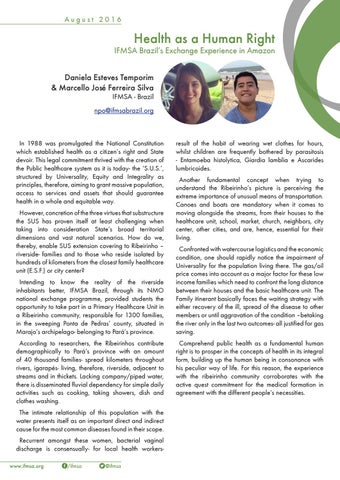August 2016
Health as a Human Right
IFMSA Brazil’s Exchange Experience in Amazon Daniela Esteves Temporim & Marcello José Ferreira Silva
IFMSA - Brazil
npo@ifmsabrazil.org
In 1988 was promulgated the National Constitution which established health as a citizen’s right and State devoir. This legal commitment thrived with the creation of the Public healthcare system as it is today- the ‘S.U.S.’, structured by Universality, Equity and Integrality as principles, therefore, aiming to grant massive population, access to services and assets that should guarantee health in a whole and equitable way. However, concretion of the three virtues that substructure the SUS has proven itself at least challenging when taking into consideration State’s broad territorial dimensions and vast natural scenarios. How do we, thereby, enable SUS extension covering to Ribeirinho – riverside- families and to those who reside isolated by hundreds of kilometers from the closest family healthcare unit (E.S.F.) or city center? Intending to know the reality of the riverside inhabitants better, IFMSA Brazil, through its NMO national exchange programme, provided students the opportunity to take part in a Primary Healthcare Unit in a Ribeirinho community, responsible for 1300 families, in the sweeping Ponta de Pedras’ county, situated in Marajo’s archipelago- belonging to Pará’s province. According to researchers, the Ribeirinhos contribute demographically to Pará’s province with an amount of 40 thousand families- spread kilometers throughout rivers, igarapés- living, therefore, riverside, adjacent to streams and in thickets. Lacking company/piped water, there is disseminated fluvial dependency for simple daily activities such as cooking, taking showers, dish and clothes washing. The intimate relationship of this population with the water presents itself as an important direct and indirect cause for the most common diseases found in their scope. Recurrent amongst these women, bacterial vaginal discharge is consensually- for local health workerswww.ifmsa.org
/ifmsa
@ifmsa
result of the habit of wearing wet clothes for hours, whilst children are frequently bothered by parasitosis - Entamoeba histolytica, Giardia lamblia e Ascarides lumbricoides. Another fundamental concept when trying to understand the Ribeirinho’s picture is perceiving the extreme importance of unusual means of transportation. Canoes and boats are mandatory when it comes to moving alongside the streams, from their houses to the healthcare unit, school, market, church, neighbors, city center, other cities, and are, hence, essential for their living. Confronted with watercourse logistics and the economic condition, one should rapidly notice the impairment of Universality for the population living there. The gas/oil price comes into account as a major factor for these low income families which need to confront the long distance between their houses and the basic healthcare unit. The Family itinerant basically faces the waiting strategy with either recovery of the ill, spread of the disease to other members or until aggravation of the condition –betaking the river only in the last two outcomes- all justified for gas saving. Comprehend public health as a fundamental human right is to prosper in the concepts of health in its integral form, building up the human being in consonance with his peculiar way of life. For this reason, the experience with the ribeirinho community corroborates with the active quest commitment for the medical formation in agreement with the different people’s necessities.
